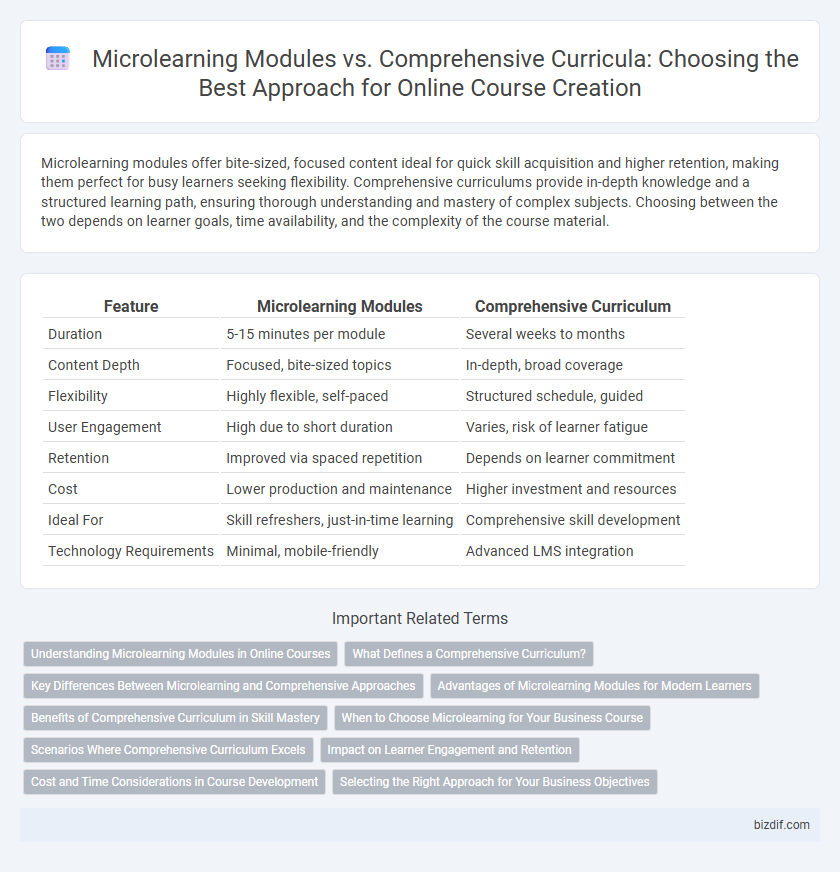Microlearning modules offer bite-sized, focused content ideal for quick skill acquisition and higher retention, making them perfect for busy learners seeking flexibility. Comprehensive curriculums provide in-depth knowledge and a structured learning path, ensuring thorough understanding and mastery of complex subjects. Choosing between the two depends on learner goals, time availability, and the complexity of the course material.
Table of Comparison
| Feature | Microlearning Modules | Comprehensive Curriculum |
|---|---|---|
| Duration | 5-15 minutes per module | Several weeks to months |
| Content Depth | Focused, bite-sized topics | In-depth, broad coverage |
| Flexibility | Highly flexible, self-paced | Structured schedule, guided |
| User Engagement | High due to short duration | Varies, risk of learner fatigue |
| Retention | Improved via spaced repetition | Depends on learner commitment |
| Cost | Lower production and maintenance | Higher investment and resources |
| Ideal For | Skill refreshers, just-in-time learning | Comprehensive skill development |
| Technology Requirements | Minimal, mobile-friendly | Advanced LMS integration |
Understanding Microlearning Modules in Online Courses
Microlearning modules in online courses deliver focused, bite-sized content that enhances retention and accommodates busy schedules, contrasting with comprehensive curricula that provide broad, in-depth coverage. These modules leverage spaced repetition and interactive elements to boost learner engagement and knowledge retention efficiently. Microlearning's adaptability suits just-in-time learning needs, making it ideal for skill acquisition and continuous professional development.
What Defines a Comprehensive Curriculum?
A comprehensive curriculum in online course creation encompasses a well-structured sequence of lessons designed to cover broad subject matter in depth, integrating diverse learning objectives, assessments, and multimedia resources. It prioritizes mastery of complex concepts over time, ensuring learners develop a thorough understanding and practical skills applicable across contexts. Unlike microlearning modules, comprehensive curricula support sustained engagement and progressive knowledge building through systematic content delivery and interactive elements.
Key Differences Between Microlearning and Comprehensive Approaches
Microlearning modules deliver concise, targeted lessons that facilitate quick knowledge absorption and higher retention through focused content segments. Comprehensive curriculums offer in-depth coverage with structured, sequential learning paths designed to build foundational understanding and mastery over broader subject areas. The key difference lies in microlearning's emphasis on brevity and flexibility versus comprehensive programs' detailed scope and extensive engagement.
Advantages of Microlearning Modules for Modern Learners
Microlearning modules offer focused, easily digestible content that fits into busy schedules, enhancing retention and engagement for modern learners. They support just-in-time learning and immediate application of skills, making them ideal for rapid knowledge acquisition and continuous professional development. These bite-sized lessons increase flexibility and accommodate diverse learning styles, leading to higher completion rates compared to comprehensive curricula.
Benefits of Comprehensive Curriculum in Skill Mastery
Comprehensive curriculum offers an in-depth and structured learning path, enabling learners to develop a thorough understanding of complex skills and concepts. It facilitates progressive knowledge building with interconnected modules that reinforce retention and application, essential for advanced skill mastery. This approach supports diverse learning styles and encourages critical thinking, leading to long-term competence and professional growth.
When to Choose Microlearning for Your Business Course
Microlearning modules are ideal for businesses aiming to deliver quick, targeted skill development that fits into employees' busy schedules, enhancing retention through bite-sized content. Choose microlearning when updating existing knowledge, onboarding new hires, or reinforcing compliance training, where concise, focused lessons drive better engagement and immediate application. For complex or in-depth subjects requiring step-by-step mastery, a comprehensive curriculum remains the preferred approach to ensure thorough understanding and skill acquisition.
Scenarios Where Comprehensive Curriculum Excels
Comprehensive curriculum excels in scenarios requiring deep, structured learning such as professional certifications, academic programs, or complex skill development where foundational knowledge and advanced concepts must be systematically covered. It supports layered information delivery through extensive modules that build on each other, promoting long-term retention and mastery. Ideal for industries like healthcare, engineering, and law, comprehensive curricula ensure learners acquire a holistic understanding essential for critical decision-making and expertise.
Impact on Learner Engagement and Retention
Microlearning modules enhance learner engagement and retention by delivering focused, bite-sized content that fits easily into busy schedules, promoting frequent interaction and immediate application of knowledge. Comprehensive curricula provide in-depth understanding through structured, sequential lessons that build foundational skills and encourage long-term mastery. Balancing microlearning for quick wins with comprehensive coursework supports diverse learning preferences and maximizes overall educational impact.
Cost and Time Considerations in Course Development
Microlearning modules reduce course development costs by requiring fewer resources and shorter production cycles compared to comprehensive curriculums, which demand extensive planning and content creation. Time investment for microlearning focuses on rapid deployment and iterative updates, while comprehensive curriculums involve longer development timelines to ensure depth and coherence. Choosing microlearning can lead to faster ROI and budget efficiency, especially in dynamic fields needing frequent content refreshment.
Selecting the Right Approach for Your Business Objectives
Microlearning modules offer targeted, bite-sized content ideal for skill-specific training and rapid knowledge retention, while comprehensive curricula provide an in-depth, structured learning path suited for mastering complex subjects. Choosing between microlearning and comprehensive curriculum depends on business objectives such as time constraints, employee proficiency levels, and the need for scalability. For businesses aiming for quick upskilling and flexible learning, microlearning enhances engagement, whereas comprehensive curricula support long-term development and expertise building.
Microlearning modules vs Comprehensive curriculum Infographic

 bizdif.com
bizdif.com